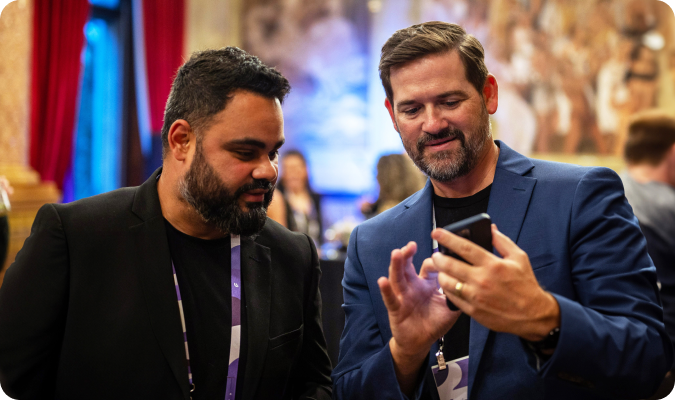
Event planner, event coordinator, PCO, event manager, meeting planner… these are just a few of the titles and roles that attempt to capture the varied and rapidly evolving work that event professionals do.
In this article, we’re focusing on meeting planners and professional conference organizers (PCOs), delving into how their roles have evolved beyond traditional event management. Specifically, we’re examining how they can cater to the unique needs of associations and not-for-profit organizations.
What is the role of meeting planners?
Let’s hit pause for a second to take it back to basics (seasoned event professionals might want to skip ahead) – what do meeting planners do, exactly?
A meeting planner is responsible for organizing and coordinating a variety of events on behalf of individuals, companies, and organizations. These events can range from small corporate meetings and seminars, to larger conferences and conventions. They are often a jack/jill of all trades, skillfully shifting between logistical, operational, and client-relationship management roles to ensure the meeting runs to budget, time, and the client’s needs. This means that meeting planners handle a wide range of tasks spanning the areas listed below.
Key responsibilities: Meeting planner
- Venue selection: Researching and selecting appropriate venues based on client preferences, budget, capacity, and location.
- Contract negotiation: Negotiating contracts with venues, vendors, and suppliers to secure favorable terms and pricing for services such as catering, AV equipment, and accommodation.
- Budget management: Developing and managing event budgets, and tracking expenses and registrations to maximize profitability and minimize costs.
- Logistics: Coordinating all logistical aspects of events, including transportation, accommodation, catering, exhibitors, equipment rentals, event staging and signage.
- On-site management: Managing event logistics on-site, including set-up, coordination of vendors, event registration/check-in, attendee assistance, and troubleshooting any issues that arise during the event.
- Program management: Collaborating with clients to develop event agendas, schedules, and run sheets.
- Communication: Serving as the primary point of contact for clients, vendors, and attendees, and providing clear and timely communication throughout the event planning process.
- Risk management: Identifying potential risks and developing contingency plans to mitigate them, ensuring the safety and security of all meeting attendees.
What is the role of professional conference organizers?
A Professional Conference Organizer (PCO) is responsible for the end-to-end coordination and management of large-scale events like conferences, conventions, and symposiums on behalf of their clients.
A PCO (and their team) have specialized knowledge and expertise in conference management, sometimes in particular industries, and typically offer comprehensive event management services tailored to the unique needs of conferences, including strategic planning, marketing, sponsorship management, and post-event evaluation.
Key responsibilities: PCO
- Venue selection
- Logistics, event staging and production
- Budget management
- Event marketing and promotion
- Attendee registration
- On-site check-in
- Attendee/delegate management
- Sponsor, exhibitor and vendor management (incl. lead capture)
- Audience engagement and networking
- Abstract submission and management
- Speaker management
- Risk management and mitigation
- Volunteer and staff management
- Technical support
- Reporting and analytics
What are the roles of associations and not-for-profits (and where do events fit in)?
Associations and not-for-profit organizations (NFPs) serve various functions, primarily centered around advancing a specific cause, industry, or community. Events play a crucial role in helping associations and NFPs achieve their goals – for example:
Networking, community building and member engagement
Associations and NFPs provide platforms for members to connect, share knowledge, collaborate, and build relationships and community. Events such as conferences, seminars, workshops, and networking sessions provide opportunities for members to engage actively with the organization and each other.
Fundraising
Gala dinners, charity auctions, fundraising events, and sponsorship opportunities enable associations and NFPs to raise funds to support their programs, initiatives, and operational expenses. Events also offer a platform to showcase the organization’s impact and attract donors and sponsors who share their mission and values.
Awareness and advocacy
Associations often advocate for particular issues, initiatives, and their members’ interests. Through conferences, seminars, rallies, and community events, these entities can mobilize support, educate the public, and advocate for their cause, driving change and influencing public opinion and policy.
Professional development and education
Associations offer educational resources, training programs, and professional development/CPD opportunities to enhance members’ skills and knowledge within their field. Events such as conferences, workshops, seminars, webinars, and training programs are essential avenues for delivering this, helping members stay up-to-date on industry trends, acquire new skills, and expand their knowledge base.
Event management in membership platforms
The importance of networking technology for associations who run events becomes evident when considering the limitations of many Association Management Systems (AMS) in handling event management.
Though you might find basic event registration modules in AMSs, as their primary focus is on membership management, the events functionality often falls short, lacking the robust features necessary for effective event planning and execution.
Moreover, implementing these limited event management features can be costly for associations. As a result, associations may find it beneficial to explore dedicated event management solutions that offer comprehensive features tailored specifically for event planning, registration, attendee management, and engagement/networking. By investing in specialized event management technology, associations can streamline their event processes, enhance attendee experiences, and ultimately maximize the impact of their events.
The expanded roles of meeting planners and professional conference organizers
In the evolving landscape of event planning, PCOs and meeting planners are now taking on increasingly strategic and comprehensive roles, particularly in associations and NFPs. Today’s PCOs work closely with their clients to understand their objectives and develop event strategies that align with business goals and maximize ROI. All while managing all the operational details to execute the event itself, anticipating and fixing problems, and often pulling nothing short of a miracle to provide a smooth and positive experience for attendees (and thus their client).
Here are some of the ways that meeting planner and PCO roles have evolved beyond traditional event management.
Strategic partner
Meeting planners and PCOs are increasingly seen as strategic partners who collaborate closely with clients to align events with overarching goals. They go beyond on-site logistical execution to understand clients’ objectives and develop event strategies that support those goals. This includes defining target audiences, crafting content that resonates with participants, and designing experiences that drive desired outcomes, such as brand awareness, lead generation, or knowledge sharing.
Content curator
Recognizing that compelling content is essential for engaging participants prior to, during, and after an event, meeting planners and PCOs are taking on a more active role in the strategy, ideation, and creation of content. They work with clients to identify relevant topics, source knowledgeable speakers, and design sessions that offer meaningful insights and actionable takeaways. By curating high-quality content, planners add value that enhances the overall attendee experience and contributes to the event’s success.
Participant engagement
Engaging participants before, during, and after the event has become a priority for meeting planners and PCOs. They leverage various strategies and technologies to foster interaction, collaboration, and networking among attendees. This may include interactive sessions, live polling, Q&A sessions, networking opportunities, virtual engagement tools, and social media integration. By enhancing participant engagement, planners create memorable experiences that drive attendee satisfaction and retention. Read about more virtual event engagement ideas.
Data management and insights
Meeting planners and PCOs are increasingly managing data for their clients, for example, verifying memberships and professional development credits. They are also leveraging data analytics to gain insights into member and attendee behavior, preferences, and interests. By collecting and analyzing data from registration systems, surveys, social media, and mobile apps, they can tailor event experiences to meet the needs and expectations of participants. Data-driven insights also inform strategic decision-making, helping planners optimize event performance and ROI.
Technology integration
Meeting planners and PCOs are now experts in tech, and are helping lead the way for their clients, adopting event management platforms, mobile apps, virtual event platforms, and other digital tools to streamline processes, create innovative and immersive event experiences, and facilitate registration, communication, content delivery, and participant engagement.
Thus a PCO and their team aren’t only skilled in event management; they are also design wizards, technical experts, client-relationship and negotiator-extrordinaires, and great people leaders.
Benefits of involving meeting planners in association and event membership management
In essence, the involvement of meeting planners and PCOs in both event and membership management creates synergies that benefit both associations/non-profits and the meeting organizers themselves. Here’s how:
- Shared database: Meeting planners often work with members and attendees, and since meetings and memberships often share a common database, there is an inherent synergy in leveraging this data for both purposes. By having access to a unified database, meeting planners can streamline processes such as renewals, new member sign-ups, event registration, accommodation, travel arrangements, and more.
- Cost efficiency: By engaging meeting organizers to assist with membership management services, associations and non-profits can contain costs. Instead of investing in separate systems or personnel for membership management, they can leverage the expertise of meeting planners who already have the necessary infrastructure and skills in place.
- Business growth: For PCOs and meeting planners, offering membership management services allows them to diversify their business offerings without dramatically increasing costs. By expanding their services to include membership management, they can tap into new revenue streams and grow their business while leveraging their existing skills in negotiation, communication, organization, and problem-solving.
Ultimately, the collaboration between associations/non-profits and meeting organizers creates a win-win relationship. Associations and non-profits benefit from cost-effective membership management services, streamlined processes, and well-executed events, while meeting planners expand their business opportunities and provide added value to their clients. This synergy fosters mutual success and strengthens the partnership between the two parties.
Conclusion
In today’s competitive market for meetings and events, PCOs and meeting planners are always looking for ways to improve profitability. Extending existing relationships into new areas while avoiding the need for deploying new technology is a proven and repeatable exercise that makes a positive impact on the industry.
There’s nothing wrong with a win-win relationship!
Associations | Event Industry Trends | Industry
See EventsAir in action
Discover why 12,000+ event professionals trust EventsAir to deliver effortless events, every time.




